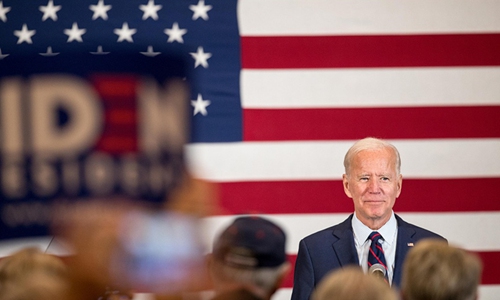Tech companies anticipate continuing rivalry between US, China despite Biden's election
By GT staff reporters Source: Global Times Published: 2020/11/8 19:18:40

US President-elect Joe Biden Photo: VCG
The latest US presidential election result has led to mixed feelings of Chinese business representatives and analysts who are predicting that the Trump administration's hostile policy toward Chinese tech companies may be eased next year when the new Biden government takes charge.Though major Chinese tech giants, such as Tencent and Huawei, have not issued any official statements on Biden's victory, sources close to those companies told the Global Times over the weekend that they have been keeping a close eye on the US election.
Some analysts warned that although the China-US relationship will enter a "new period" as US President-elect Joe Biden is expected to come up with a far more moderate foreign policy, the long-term technology rivalry between the two economic superpowers won't change. Some also urged industry representatives to drop the illusion that changing leadership in America will automatically solve existing issues between the two nations.
For China's high-tech sector, it is more important to focus on advancing technology development and self-reliance in core technologies, rather than pinning too high hopes on the politicians on the other side of the Pacific.
"We're happy to hear that Biden has won the election, as China-US relations have worsened on the watch of Trump administration. We look forward to some improvement after Biden takes office," Jason Ji, a manager of an electronic company based in Shenzhen, South China's Guangdong Province, told the Global Times on Sunday.
Ji said that under the US supply restrictions, it has taken longer for some Shenzhen companies - which source certain parts and chips from US suppliers - to deliver finished products to clients.
"Trump's hostile policy against China's tech rise has affected my company's business to some extent, and we are now closely watching to see if Biden will relax the chip curbs on Chinese companies," Ji said, adding that his firm has begun sourcing some parts from Chinese firms this year.
Some analysts agreed that the Chinese technology sector should be a little more optimistic if Biden comes into office, after the unprecedentedly hostile approach taken by the Trump administration, which has created hurdles to not just the Chinese companies, but also those in the US who view China as a very important part of their supply chain.
"Chinese technology companies may gain some opportunities and breathing time as a result," said Sun Yuzhong, a researcher at the Institute of Computing Technology under the Chinese Academy of Sciences. He predicted that Trump's ban on WeChat and TikTok would be lifted under the incoming Biden administration.
However, he added that technology rivalry between the two nations is inevitable, especially when China's technology level is advancing and becoming more competitive in the global market.
In the face of the latest results from the US presidential election, some Chinese companies have exhibited calmness. Some told the Global Times that they will focus on improving their own tech capability, regardless of how the external environment evolves.
"The new US presidency won't change the overall trend of that government cracking down on Chinese high-tech firms, although there may be a different approach," an employee of a drone-maker based in Shenzhen, who spoke on condition of anonymity, told the Global Times on Sunday.
He predicted that it is very likely that Washington will continue to target China "to cover up its internal issues, like its social divide."
A source with a leading state-owned technology company also told the Global Times on Sunday that Biden's stance over the trade and technology sector could take a similar tune to that of Trump.
"Biden said on several occasion while running for president that he will resist foreigners' coveting of America's intellectual property rights, which is explicitly pointing at China, and therefore, he is likely to tighten licensing of intellectual property rights to Chinese companies," said the source.
Biden in the past days has repeatedly talked about restoring the US' ability to produce and innovate, which means more competition in high technology, he said.
"From our point of view, we ought to keep cautious, and it would be better to throw away the fantasy and step up our own efforts to innovate," said the source, noting that in any case, China will remain committed to self-reliance and independent innovation.
Posted in: ECONOMY